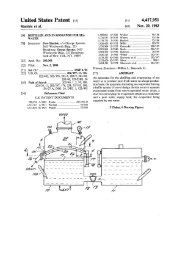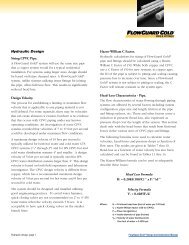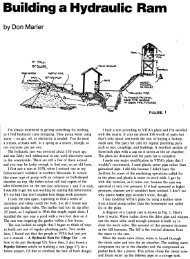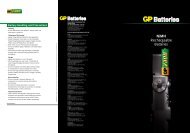Small Scale Foundries for Developing Published by: Intermediate ...
Small Scale Foundries for Developing Published by: Intermediate ...
Small Scale Foundries for Developing Published by: Intermediate ...
You also want an ePaper? Increase the reach of your titles
YUMPU automatically turns print PDFs into web optimized ePapers that Google loves.
CI-LM’TER 1<br />
INTRODUCTION<br />
The Role Of The Foundry<br />
Castings in iron, brass, aluminium, or other<br />
metals are an essential part of most engineering<br />
products, and a foundry in which to<br />
make them is needed <strong>by</strong> any developing<br />
industrial society. Although the production<br />
of castings on a large scale is a sophisticated<br />
and capital intensive business, there can be a<br />
useful market <strong>for</strong> small scale foundries producing<br />
castings <strong>for</strong> building and domestic<br />
products, machinery parts, and spare parts<br />
<strong>for</strong> other equipment.<br />
Some foundries are independent organisations<br />
producing castings <strong>for</strong> a number of<br />
customers. Other foundries are departments<br />
of larger concerns, which need their own<br />
source of castings <strong>for</strong> their products, or <strong>for</strong><br />
the production of spare parts.<br />
<strong>Foundries</strong> may specialise in one or more<br />
types or sizes of casting, or produce a wide<br />
range of types of product. Some castings are<br />
used <strong>for</strong> standard items such as pipe fittings,<br />
manhole covers and cooking stoves, whilst<br />
others have to be made individually <strong>for</strong> each<br />
application.<br />
Many foundries have their own machining<br />
workshops to produce finished components<br />
or products, while others only make<br />
raw castings.<br />
Foundry technology is changing rapidly,<br />
<strong>for</strong> small foundries as well as <strong>for</strong> large; casting<br />
production. is becoming more of a<br />
science with modern techniques, and less of<br />
a traditional art. Nevertheless many valuable<br />
skills have to be learned and experience<br />
as well as theoretical knowledge is needed <strong>by</strong><br />
the foundryman.<br />
Some of the more commonly required<br />
types of casting which might be produced <strong>by</strong><br />
small scale foundries are listed below.<br />
Such a list can never be complete - one of<br />
the advantages of the foundry process is its<br />
flexibility, and the possibility of making all<br />
sorts and types of casting <strong>for</strong> a wide range of<br />
applications.<br />
Cast Iron<br />
Castings<br />
Stoves<br />
Pulleys<br />
Manhole<br />
covers<br />
Pipe fittings<br />
Pumps<br />
Fire bars<br />
Brake<br />
drums<br />
Vehicle<br />
Spares<br />
Bearing<br />
blocks<br />
Valves<br />
Machinery<br />
spares<br />
Aluminium<br />
Castings<br />
Levers &<br />
handles<br />
Fan and<br />
motor<br />
housings<br />
Cooking<br />
pots and<br />
kitchen<br />
tools<br />
Portable<br />
pump<br />
bodies<br />
Pulleys<br />
Irrigation<br />
pipe fittings<br />
Light<br />
fittings<br />
Door<br />
furniture<br />
/<br />
Machinery<br />
spare parts<br />
<strong>for</strong> all types<br />
of<br />
equipment<br />
Brass &<br />
Bronze<br />
Castings<br />
Valves &<br />
taps <strong>for</strong><br />
corrosive<br />
liquids<br />
Bearings<br />
and bushes<br />
Boat parts<br />
and<br />
propellors<br />
Pump<br />
bodies and<br />
pump<br />
impellors<br />
Ornamental<br />
and<br />
decorative<br />
castings<br />
Door<br />
furniture<br />
Machinery<br />
spare parts<br />
<strong>for</strong> all types<br />
of<br />
equipment














